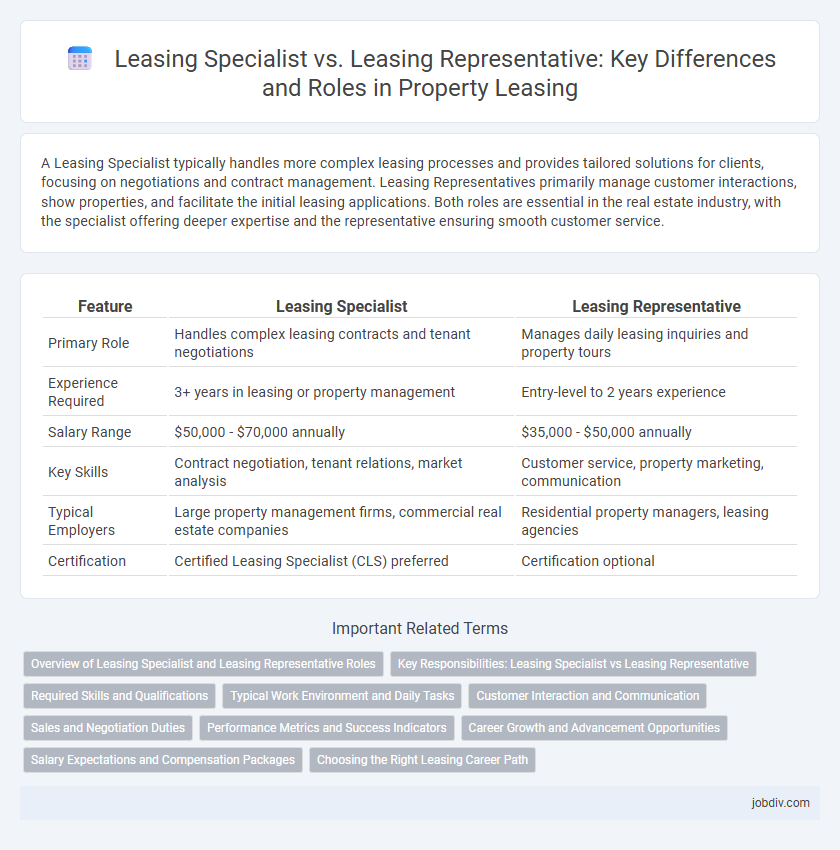A Leasing Specialist typically handles more complex leasing processes and provides tailored solutions for clients, focusing on negotiations and contract management. Leasing Representatives primarily manage customer interactions, show properties, and facilitate the initial leasing applications. Both roles are essential in the real estate industry, with the specialist offering deeper expertise and the representative ensuring smooth customer service.
Table of Comparison
| Feature | Leasing Specialist | Leasing Representative |
|---|---|---|
| Primary Role | Handles complex leasing contracts and tenant negotiations | Manages daily leasing inquiries and property tours |
| Experience Required | 3+ years in leasing or property management | Entry-level to 2 years experience |
| Salary Range | $50,000 - $70,000 annually | $35,000 - $50,000 annually |
| Key Skills | Contract negotiation, tenant relations, market analysis | Customer service, property marketing, communication |
| Typical Employers | Large property management firms, commercial real estate companies | Residential property managers, leasing agencies |
| Certification | Certified Leasing Specialist (CLS) preferred | Certification optional |
Overview of Leasing Specialist and Leasing Representative Roles
Leasing Specialists manage comprehensive leasing processes, including tenant screening, lease agreement preparation, and ensuring compliance with property regulations to maximize occupancy and revenue. Leasing Representatives focus on customer engagement, conducting property tours, and addressing prospective tenants' inquiries to facilitate lease signings and maintain positive client relationships. Both roles are essential in property management teams, with Leasing Specialists emphasizing operational oversight and Leasing Representatives prioritizing tenant interaction.
Key Responsibilities: Leasing Specialist vs Leasing Representative
Leasing Specialists manage complex lease agreements, negotiate terms, and ensure compliance with legal standards, while Leasing Representatives primarily focus on customer service, property tours, and processing lease applications. Leasing Specialists analyze market trends to optimize leasing strategies, whereas Leasing Representatives handle day-to-day tenant inquiries and facilitate initial lease documentation. Both roles require strong communication skills but differ in scope, with Specialists driving leasing policies and Representatives supporting tenant relations.
Required Skills and Qualifications
Leasing Specialists require strong negotiation skills, in-depth knowledge of lease agreements, and proficiency in property management software to effectively manage tenant relations and lease documentation. Leasing Representatives need excellent customer service abilities, strong communication skills, and basic understanding of leasing processes to assist prospective tenants and facilitate lease signings. Both roles benefit from a background in real estate or property management, but Leasing Specialists typically demand more advanced experience and technical expertise.
Typical Work Environment and Daily Tasks
Leasing Specialists typically work in commercial or residential property management offices, handling complex lease negotiations, contract preparation, and compliance monitoring to ensure legal and financial accuracy. Leasing Representatives often operate in retail leasing environments or residential communities, focusing on property tours, client interactions, application processing, and resolving tenant inquiries. Both roles require effective communication, but Leasing Specialists engage more in strategic planning and regulatory adherence, while Leasing Representatives concentrate on customer service and lease execution.
Customer Interaction and Communication
Leasing Specialists typically engage in in-depth customer interactions, offering detailed property information and addressing complex inquiries to facilitate lease agreements. Leasing Representatives focus on initial customer communication, guiding prospects through basic qualification and application processes with clear, concise information. Both roles require strong interpersonal skills but differ in the depth and scope of customer engagement.
Sales and Negotiation Duties
A Leasing Specialist focuses on advanced sales strategies, client relationship management, and contract negotiation to maximize lease agreements' value, often handling complex transactions requiring in-depth market knowledge. A Leasing Representative primarily executes direct leasing sales, conducts property tours, and assists prospective tenants through basic negotiation processes aimed at meeting monthly occupancy targets. Both roles require strong communication skills, but Leasing Specialists typically engage in higher-level negotiations and sales forecasting to drive revenue growth.
Performance Metrics and Success Indicators
Leasing Specialists typically demonstrate higher performance metrics in tenant acquisition rates and lease renewal percentages due to advanced expertise in market analysis and negotiation strategies. Leasing Representatives focus on customer service quality and lead follow-up efficiency, which are key indicators of their success in generating qualified prospects and maintaining tenant satisfaction. Evaluating employee success requires analyzing metrics such as lease conversion ratios, average lease duration, and tenant retention rates specific to each role's responsibilities.
Career Growth and Advancement Opportunities
Leasing Specialists typically handle complex lease negotiations and portfolio management, positioning them for faster career advancement into property management or real estate investment roles. Leasing Representatives focus on customer service and tenant relations, providing foundational skills that support progression into sales or leasing coordinator positions. Specializing as a Leasing Specialist often leads to higher earning potential and leadership opportunities within the leasing sector.
Salary Expectations and Compensation Packages
Leasing Specialists typically command higher salary expectations due to their advanced expertise in property management and tenant relations, averaging between $45,000 and $60,000 annually. Leasing Representatives generally earn between $35,000 and $50,000, reflecting more entry-level responsibilities and limited negotiation roles. Compensation packages for Leasing Specialists often include performance bonuses and comprehensive benefits, whereas Leasing Representatives may receive more basic benefits and commission-based incentives.
Choosing the Right Leasing Career Path
Leasing specialists typically handle complex leasing agreements and portfolio management, requiring advanced knowledge of market trends and legal regulations, while leasing representatives focus on customer interactions, property tours, and initial lease negotiations. Choosing the right leasing career path depends on your strengths and interests: if you excel in detailed contract analysis and strategic planning, a leasing specialist role may suit you; if you thrive in sales and client relationship building, a leasing representative position might be ideal. Understanding the distinct responsibilities and growth opportunities in both roles helps align your career with long-term professional goals in property management.
Leasing Specialist vs Leasing Representative Infographic

 jobdiv.com
jobdiv.com